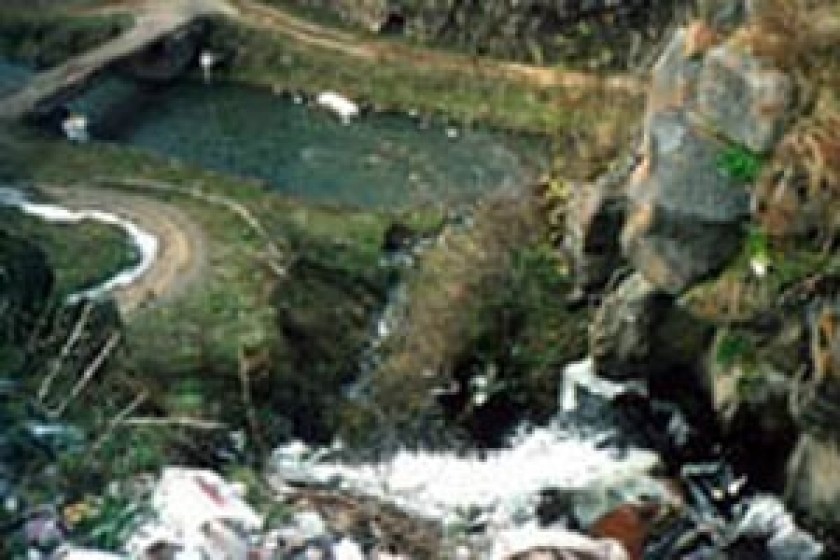
Pollution of the Debed River has become a health hazard
Visitors in Alaverdi always notice the city's little waterfall. When they ask what it's called, the locals frown, and are forced to admit that it's not a waterfall at all, but sewage from the Sarahart district falling into the Debed River .
Sewers in the uphill neighborhoods of Alaverdi have never been hooked up to the city's sewage treatment plant. The same problem exists in the Sanahin and Shahumian districts, where instead of a waterfall, there are small lakes of sewage that flow straight into the river. In order to direct this sewage to the treatment plant, a pipeline needs to be built, which, according to the mayor's office, would take 180 million drams. But even if the local authorities could build the pipeline, it wouldn't save the river from sewage. It would take another 50 million drams to put the sewage treatment plant, which has been shut down for 13 years, back into operation. Rusting equipment, no longer guarded round the clock, is the sole reminder of the plant's past.
Garbage is another problem in Alaverdi. People who live near the Sanahin Railroad Station have recently received a garbage dumpster-one dumpster for seven apartment buildings and a number of houses. But the mayor's office says the lack of dumpsters is not the whole story-people have simply gotten used to throwing their household garbage and sewage into the river.
The situation is the same in most of the towns throughout the Lori Marz. In Spitak, the foundations for a sewage treatment plant were laid on the bank of the Pambak River back in Soviet times, but no construction work has been done since. All of the city's sewage-27,000 cubic meters a month-goes straight into the river. Vanadzor creates 20 times more sewage than any other city in the area-as much as 22,000 cubic meters a day. All of it flows into the river, after only mechanical purification. Vanadzor's 35- year-old sewage treatment plant, ill equipped to begin with, is now sadly in need of repair. It was designed in Soviet times for mechanical, biological, and chemical sewage treatment, but after the collapse of the USSR , most of these plans remained on paper. According to director Rudik Malkhasyan, it would take an investment of 20 million drams to get the plant running properly, money the marz does not have.
In all, 800,000 cubic meters of sewage runs into the Debed River Basin every month, 0.1 % of the total water flow. According to a study conducted by the Vanadzor office of the Helsinki Citizens' Assembly of Armenia, there are two liters of wastewater in every 100 liters of water in the basin.
Melania Stepanyan, who runs the laboratory at the Lori Regional Department of the State Ecological Inspection of the Ministry of Ecology, explains: "According to our tests, in 1988, one liter of water taken from the Pambak River at a distance of 100 meters from the Vanadzor plant contained 2.6 mg of ammonium, whereas the standard is no more than 0.5 mg. 2001 test results show 3.5 mg of ammonium in one liter of water, and 2003 tests show the highest concentration of ammonium - 4.5 mg per liter. It should be pointed out that the factories here have been shut down for years, and the increase in the ammonium concentration is due to sewage. The concentrations of chlorine, sulphate, and other saline in the river aren't over the limit, but the presence of sewage indirectly affects their concentrations. In other words, the wastewaters contribute to an increase of ammonium and, as a result, the oxygen in the water decreases. The higher the concentration of ammonium, the greater the oxygen deficiency. "
Her agency has identified 238 sources of pollution along the Pambak, Dzoraget and Debed Rivers , among them numerous residential and community services (barbecue stands and toilets built along the rivers, etc.). Household garbage is frequently part of the mix. "Garbage collection isn't properly organized everywhere. In many places, the garbage flows into the river when it rains," Stepanyan says. Even though local communities allocate money for garbage collection, along the riverbanks, construction refuse and household garbage often go straight into the water.
Industry is another major source of pollution. Among the factories that dump their waste into the rivers are Prometheus-Kimprom CJSC in Vanadzor, Armenian Copper Program (ACP) CJSC in Alaverdi, and Metal-Prince CJSC in Akhtala.
ACP seriously affects the ecological balance of the Debed basin. The company's ecologist, Suren Yeritsyan, insists that their wastewater is very similar to the river water in composition; indeed, the concentration of petroleum products in the river is eight times as high as in their waste. He says ACP is currently looking into the possibility of introducing a closed-cycle water usage system, through which "pollution from the company would be eliminated."
Metal Prince is another company that dumps wastewater and other detritus into the river.
The pollution has potentially far-reaching consequences. According to the Lori Regional Department of the State Ecological Inspection, "Because household and industrial waste is dumped into the Debed without specific biological purification or neutralization, using water from the Debed River for irrigation can be dangerous, and agricultural products irrigated with river water are a potential source of disease." Karine Mirzoyan, head physician at the Lori regional anti-epidemic inspection, agrees, fearing the spread of disease through both recreational and agricultural use of river water.
Nothing will change unless the problems of garbage collection and waste treatment are solved.
To deal with the situation, the establishment of a River Basin Council is planned, within the framework of the program Water Resources Management in the South Caucasus , funded by Development Alternatives, Inc. Representatives of state entities, local authorities, and NGOs will together develop recommendations for solving the problems facing the Debed River basin .
 Videos
Videos Photos
Photos
Write a comment